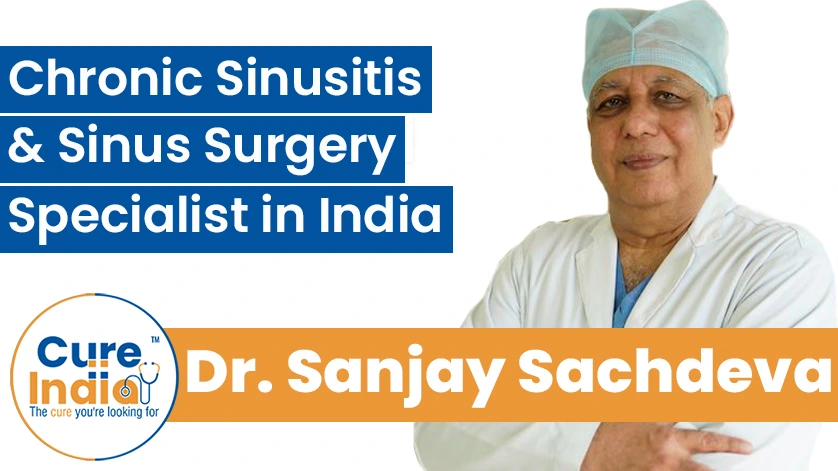

The sinus is a space or a cavity present in the skull bones of the face that is connected to the eyes and nose and is situated at the front side of our face. One of the functions of these cavities is to make the skull lighter. Another function of this sinus cavity is to produce the mucus that flows and forms a protective layer in the nasal cavity and traps any unwanted and foreign particles such as infectious organisms, pollutants, dirt, etc.
Surgery of the sinuses is required when the passageway of your sinus is blocked. The sinuses can get blocked due to many reasons, the most common being the infection in the sinuses. The surgery helps to remove these blockages and drain the accumulated mucus from these pathways. Many African countries like Cameroon, Tanzania, Uganda, and Congo have limited access to specialized medical care due to a lack of healthcare facilities, unaffordability of the treatments, and risk of complications post-treatment. Also, the medical specialists are not as highly trained due to inadequate training resources, as compared to other developed countries.
Because of this reason, many patients from low-middle-income countries travel to India for sinus disease treatment. The reason why they choose India over other countries is because of increased affordability along with the quality treatments.
Sinusitis is involved in swelling of the nasal and producing mucus. There are different types of sinusitis based on the difference in its length:
Common sinusitis symptoms include:
Some other symptoms of sinus infection are:
A sinus infection treatment can be done with proper medication rather than surgery. But it may become important when sinus infections are persistent or recurrent. surgery may be performed to treat sinuses permanently. surgery is performed mainly to treat patients with chronic sinusitis.
The goal of surgery is to take away things which are blocking the pathways of the sinuses. This include:
Other reasons for sinus disease surgery are sinusitis and nasal polyps.
It is the swelling in the nasal passages. The common symptoms are:
Nasal polyps are swelling in the nasal lining. Common symptoms are:
CureIndia helps you choose the right doctor for your medical treatment. Most of the doctors in our associated hospitals have been internationally trained and are active members of many international medical councils and associations. Let's hear from some of our most reputed ENT and sinus surgery doctors in India:
Dr. Sanjay Sachdeva is a leading ENT specialist in India who is known for his advanced skills in treating chronic sinusitis, nasal polyps, and complex sinus disorders. He is recognised for his proficiency in endoscopic sinus surgery and offers patients safe and minimally invasive treatments that restore nasal function and relieve long-term sinus problems.

Dr. W.V.B.S. Ramalingam is a top ENT and sinus surgery specialist in India, who is known for his expertise in endoscopic sinus surgery, advanced rhinology procedures, and treatments for chronic sinus disorders. With high success rates and patient-centric treatments, he delivers effective and long-lasting treatment solutions for sinus-related conditions.

Dr. Anil Thukral is a leading ENT surgeon in India with extensive experience in sinus surgery, nasal obstruction treatment, and management of recurrent sinus infections. He is experienced in performing modern functional endoscopic sinus surgery techniques that ensure safe and minimally invasive treatments and improved breathing comfort.

Dr. Manish Gupta is a top-rated ENT surgeon in India specialising in sinus surgery, nasal airway correction, and treatment of chronic nasal and sinus conditions. His expertise in endoscopic procedures and meticulous diagnostic processes has made him a trusted choice for effective sinus surgery in India.

A lot of patients with sinus problems travel to India from many African countries like Sudan, Cameroon and Uganda to get their sinus surgery here. The cost of sinus surgery in India is the cheapest among the different countries on the globe. Indian hospitals have the most innovative approach to providing treatments and medical care. Surgeons in India are highly experienced with years of practice and knowledge. Indian hospitals provides Endoscopic Surgery, Image-Guided surgery, as well as Balloon Sinuplasty for Sinus issues. Listed below is the cost of Sinus Surgery in India.
| Treatment Name | Cost in India | Stay in India |
|---|---|---|
| Sinus Surgery in India | $1,500 - $2,000 | 5 - 7 Days |
The surgery of the sinuses is known as sinuplasty. The main goal of the surgery is to remove the blockage that might have been caused by mucous membranes, damaged or swollen tissues, cancerous growth or tumors, nasal polyps, or even thin pieces of bones. There are many different types of surgery for the sinuses and the most common ones amongst them are explained below:
FESS is the most common procedure for sinus infection in India. This procedure includes the inserting of a thin and flexible instrument named endoscopy. It contains a small camera which sends back images after inserting them into the nose. The images help doctors to see where the sinuses are blocked. With the help of this, it gently removes scar tissue, polyps, and others.
Endoscopy is done without any cut to your skin which helps in the easy and fast recovery. The patient is given anesthesia to make the area numb. You can easily go back home after the procedure is done.
This is a more easy and new process. In this procedure, a thin tube is put in your nose which is attached by a small balloon on the other side. The doctors then guide the balloon and inflate the blocked area of your nose.
This is uncommon surgical procedure which is used when other methods are not feasible. It is a slightly different type of surgery in which the sinuses are accessed by creating an opening through the maxillary sinus located behind the neck. To do this, your surgeon will make a small incision between the upper lip and the gum tissue to get the access of the maxillary sinus wall. The incision/hole is made in this wall and the blocking substance is removed from the sinuses through this hole. After the blockage (damaged tissues, bone pieces, mucous accumulation) is removed, the endoscope is removed from the hole, and the incision is closed with the stitches.
There are numerous benefits of sinus congestion surgery, especially for people who are suffering from severe and recurring sinus problems such as sinusitis. The sinuplasty surgery can give you relief from congestion, making you feel fresh and free. You will start to breathe better than before because the surgery has removed all the buildup of mucous and other debris from your sinuses and nasal cavities. The drainage from your sinuses will also improve making a smooth flow of mucus. All the pain that you have been suffering for a long time such as pain in the face, around the nose and eyes, headaches, pressure in the eyes, nose, and forehead, and more, will end after the surgery. In addition to this, the structural abnormalities can also be fixed by this surgery. For example, a deviated septum, nasal bone, nasal polyps, etc are the structural abnormalities that this surgery can treat.
Severe sinus infection can cause a lot of problems and if not treated on time, it can spreas the infection to nearby organs. India is the best country for the surgery of sinus infection as the pilonidal sinus surgery cost is so low that you can receive the highest quality treatment experience while saving lot of money.
